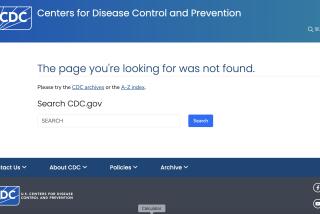Clinton Curbs Use of Genetic Data
- Share via
WASHINGTON — President Clinton on Tuesday signed an executive order limiting the use of genetic information by federal agencies in hiring and promotion as the availability of such data is exploding.
The order prohibits federal agencies from collecting genetic information from their 2.8 million civilian employees or using such information to make hiring, promotion or placement decisions.
However, ethicists and privacy advocates said that, without comprehensive federal legislation, people--including federal workers--will remain vulnerable to the misuse of such information. There are now many entities other than employers that can collect and store DNA information, they said.
States Have Collected Information for Years
“There are lots of states that have been collecting genetic information for years from newborns and wherever you’ve left tissues, cells, biopsies, blood, somebody could analyze your DNA,” said Arthur Caplan, director of the Center for Bioethics at the University of Pennsylvania.
“So there’s a lot more to do here to handle the genetic discrimination problem than to say: ‘Don’t use it in employment.’ ”
The only federal legislation that would give people protection from employment discrimination based on the use of genetic information has not been scheduled for a hearing or legislative action. It is being offered in the Senate by Minority Leader Tom Daschle (D-S.D.) and Sen. Edward M. Kennedy (D-Mass.), and in the House by Rep. Louise McIntosh Slaughter (D-N.Y.).
A provision by Sen. Olympia J. Snowe (R-Maine) and now part of legislation to give patients more rights in dealing with their managed health care plans would bar health insurers from using genetic information to raise rates or drop coverage. That bill is in a House-Senate Conference Committee.
Clinton said that new genetic information, which is rapidly becoming available as scientists finish mapping the human gene, “threatens to erode our sacred walls of privacy in ways we could not have envisioned a generation ago.”
While genome research is an enormously exciting frontier, it carries the risk of prying “open the protective doors of privacy,” Clinton said.
The motivation for the presidential order was to set an example for private employers and respond to the widespread belief by workers that, if they obtain a genetic test, the information will be accessible to employers and insurers. A 1997 survey by the National Center for Genome Resources found that 63% of those polled would not take genetic tests if they thought the information could be available to employers. Fifty percent believed that employers will ask employees to take genetic tests in the future.
“Because medical information always lurks in the back of an employer’s mind, the best protection is to preclude the employer from getting the information in the first place,” said Chai Feldblum, a professor at Georgetown Law School and an expert in privacy and disability law.
Ethicists and privacy experts said that framing new rules for genetic nondiscrimination is not a simple matter of just protecting individuals. If either individuals or employers have access to genetic information, there is potential for abuse.
For instance, a person who discovers that she has a predisposition to breast cancer could buy extra health insurance and life insurance, driving up employers’ insurance costs. Similarly employers with that information could refuse to assign people to sensitive jobs or decline to hire a person at all.
“We need rules for both sides of the street,” Caplan said.
Within the federal government, genetic information has already been gathered by some agencies, and Clinton’s order is an attempt to ensure such activities cease, except in limited circumstances.
For instance, the Department of Energy’s Lawrence Berkeley National Laboratory in California collected genetic information and tested workers for syphilis and, in the case of black workers, for sickle cell disease. That practice was challenged in court and found to be a breach of privacy.
The State Department and Central Intelligence Agency have also used some genetic information about employees, according to senior administration officials. With the order in place, its use would be limited to such purposes as identifying employees who are killed overseas.
The order has two parts: It prohibits collection of genetic information and it prohibits use of the information to discriminate in job-related decisions based on the data.
Information Cannot Be Disclosed
Providing genetic information cannot be a condition of hiring or receiving benefits under the order. If a federal agency has genetic information, it cannot be disclosed except to an occupational health and safety researcher, to the employee or under court order.
There are exceptions such as when an agency requests or uses genetic information in cases where workers already have medical conditions that affect their ability to perform their jobs. Then the information can be used to confirm diagnoses of diseases. And the information could be used if, for instance, an employee with a medical condition works in a hazardous environment, such as a lab, to determine whether he or she should be moved to another post to minimize risk.
However, the order does not cover the 1.4 million military personnel in the Department of Defense, which already follows similar genetic testing rules. Also left out are workers for federal contractors.
More to Read
Sign up for Essential California
The most important California stories and recommendations in your inbox every morning.
You may occasionally receive promotional content from the Los Angeles Times.










